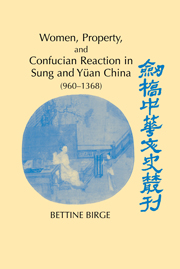Book contents
- Frontmatter
- Contents
- List of Maps, Figures, and Tables
- Chronology of Chinese Dynasties
- Abbreviations
- Acknowledgments
- Introduction
- 1 Women and Property before the Sung: Evolution and Continuity
- 2 Women and Property in the Sung: Legal Innovation in Changing Times
- 3 Women's Property and Confucian Reaction in the Sung
- 4 Transformation of Marriage and Property Law in the Yüan
- Conclusion: Gender, Mongols, and Confucian Ideals
- Bibliography
- Glossary-Index
3 - Women's Property and Confucian Reaction in the Sung
Published online by Cambridge University Press: 24 August 2009
- Frontmatter
- Contents
- List of Maps, Figures, and Tables
- Chronology of Chinese Dynasties
- Abbreviations
- Acknowledgments
- Introduction
- 1 Women and Property before the Sung: Evolution and Continuity
- 2 Women and Property in the Sung: Legal Innovation in Changing Times
- 3 Women's Property and Confucian Reaction in the Sung
- 4 Transformation of Marriage and Property Law in the Yüan
- Conclusion: Gender, Mongols, and Confucian Ideals
- Bibliography
- Glossary-Index
Summary
The legal protections and social customs governing women's property that developed in the Sung had social consequences. Daughters' inheritance syphoned assets away from the patriline and, when taken into marriage as dowry, strengthened the standing of affines at the expense of agnates. Large dowries rendered wives in elite households into independent economic entities, who to some extent were buffered from the fortunes of the house. Possession of personal property (by men or women) undermined the authority of the household head, who ostensibly regulated the daily life of family members through the power of the purse. The very concept of communal living and shared property was fundamentally incompatible with personal property. A wife's personal assets also gave her power vis-à-vis her husband and threatened the ideal of obedience and submission to him. Worst of all, the property rights of widows made remarriage especially easy and very attractive. While Chinese for centuries had lived with these contradictions between Confucian ideals and legal practice, Sung thinkers who sought to reinvigorate Confucianism confronted them head on, and not surprisingly, raised objections to women's property rights.
The Confucian reaction to women's property came from those who associated themselves with the new interpretation of Confucianism called the Learning of the Way (tao-hsüeh). These influential thinkers sought to reaffirm classical Confucian gender roles, and in the process could not help but challenge the laws and customs that supported women's property rights.
- Type
- Chapter
- Information
- Publisher: Cambridge University PressPrint publication year: 2002



